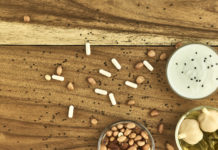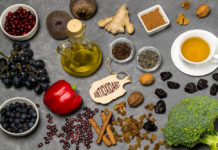Headaches are unpleasant and may even debilitate, halting your day’s entirety until they have subsided. Although it may be simple to pop medication to relieve that pesky head throb, continually doing so may lessen their effectiveness or cause other unnecessary side effects. So rather than walking towards the medicine cabinet, head to the kitchen to nourish the body and halt that headache!
What Causes Headache or Migraines?
Headaches are generally classified by cause and broken down into primary and secondary headaches. Primary headaches are caused by over activity of or problems with pain-sensitive structures in the head, including cluster headaches, migraines, tension headaches, and chronic daily headaches. They generally have no underlying cause and can be induced by multiple lifestyle factors such as poor diet, stress, and inadequate sleep. Secondary headaches signify an underlying disease that impedes on the head’s pain-sensitive nerves with possible causes including a blood clot, brain clot or tumor, ear infection, panic attack, high blood pressure, or stroke.
How to Make a Headache Go Away
With such diversifying causes of headache pain, comes various treatment modalities and interventions. Although their management varies extensively, these foods for headaches may offer a peace of mind and break from head pain:
Potassium
Working with sodium and acting as a mineral and electrolyte, potassium works inside the body’s cells to create nerve impulses and muscle contractions. Tension headaches are caused by tight muscles in the shoulders, neck, scalp and jaw with stress, depression, anxiety, lack of sleep, or excessive alcohol intake being potential triggers. And considering potassium encourages proper muscle function, the mineral may relieve tension headaches. In fact, headaches are a common symptom of hypokalemia, or low levels of potassium. Increased potassium consumption has also shown to reduce blood pressure levels, which may subsequently reduce the severity or likelihood of headaches.
Food Sources: bananas, potatoes, apricots, carrots, tomatoes, peaches, radishes, various beans (white, black, lima, soy, navy, etc.), chickpeas, prunes, lentils
Calcium
The well-known bone strengthening mineral also plays a role in muscle control and nerve function. Particularly relieving tension headaches, consuming calcium-containing foods may help alleviate headaches.
Food Sources: dairy and plant-based milks, cheese varieties, yogurt, orange juice fortified with calcium, spinach, radishes, sardines with bones, soybeans, white beans, sorghum, almonds
Magnesium
Magnesium is utilized in over 300 physiological processes, including facilitating proper nerve function. Researchers explore magnesium as a possible natural remedy for migraine relief, as evidence has suggested people who suffer from them often demonstrate lower levels of magnesium. The most prominent evidence suggests migraine improvements in individuals who experience aura, or visual perceptions of geometric patterns and shiny waves, and for women experiencing menstrual migraines.
Food Sources: whole grain cereals, quinoa, wild rice, oats, soybeans, cowpeas, almonds, cashews, peanuts, walnuts, cocoa powder, and various beans
Omega-3 Fatty Acids
Omega-3s are considered to be a healthy fat and continuously touted for their promotion of heart health. But their powerful inflammatory properties may also prevent against migraine exacerbation. Additionally, the healthy fat found in olive oil is suggested to reduce the severity, frequency, and duration of headaches.
Food Sources: flaxseeds, walnuts, pumpkin seeds, and various oils, but primarily found in fatty fish, including anchovy, tuna, herring, rainbow trout, and halibut
The Ultimate Headache Combos and Considerations
Although the identified food sources are beneficial on their own, they can harmonize not only to reduce headache severity, but offer a complete well-balanced meal or snack:
- Whole grain cereal with a cup of dairy milk and chopped banana
- Yogurt parfait layered with peaches and slivered nuts and seeds
- Beef stew utilizing potatoes, carrots, spinach, and a dash of cream
- Cottage cheese paired with fresh apricot slices and a garnish of sunflower seeds
- Tuna salad created with plain Greek yogurt and dipped with carrots
While food may act as medicine for headache relief, some may also trigger headaches and migraines. While some products are even promoted based on their nutritional content, dairy products, avocado, aged cheese, caffeine, wine, chocolate, meats with nitrates (hot dogs, bacon, etc.) and foods containing monosodium glutamate (MSG) are commonly suggested food triggers. It is important to realize, though, food triggers vary and are unique to that individual. Recognizing, journaling suspected food triggers, and presenting to a physician can further tailor your personal needs. Staying hydrated is also essential for headache prevention, as dehydration is a common trigger of headaches and migraines. Remember that pesky head pain following a night out? It is more than likely caused by alcohol’s ability to dehydrate the body. Herbal teas can also contribute to fluid intake while promoting soothing feelings. Find more ways to reduce headaches at home here.









